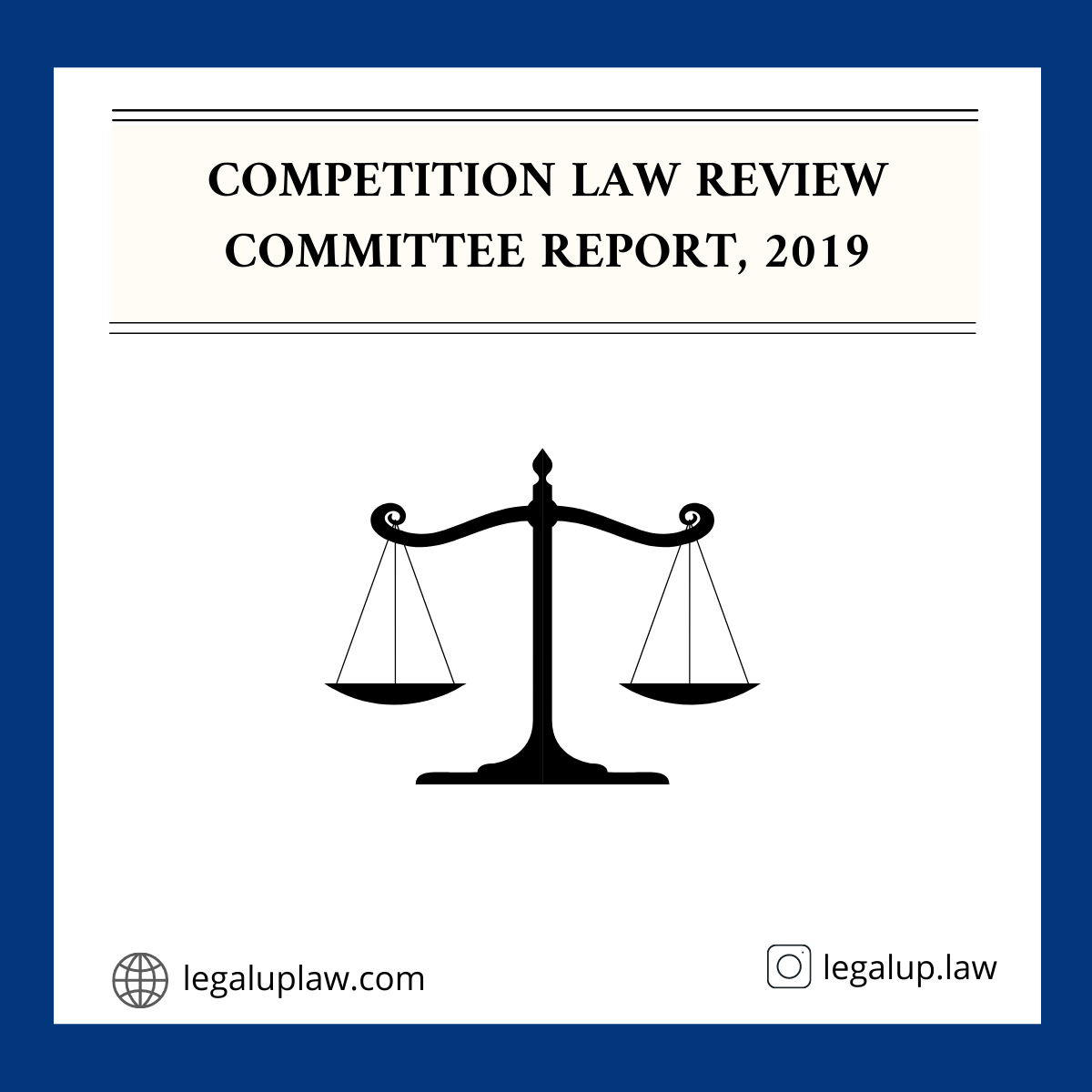The Competition Law Review Committee which was Chaired by Mr Injeti Srinivas presented the report to the Ministry of Corporate Affairs on July 26, 2019, prescribing corrections to the Competition Act, 2002. The Act builds up the Competition Commission of India (CCI) to advance rivalry, forestall against cutthroat practices and ensure shopper freedoms.
The Competition Law Review Committee suggested changes in these areas:-
Table of Contents
Administrative Body

The Committee prescribed that the Act be corrected to accommodate an overseeing body, to reinforce the responsibility of the CCI. The administering body will comprise of a chairperson, six entire time individuals, and six low maintenance individuals. It will perform semi administrative capacities, drive strategy choices, and play out an administrative job.
Inquiry
Under the Act, the Director-General (DG) conducts investigations into infringement of the Act. The Committee noticed that the DG is delegated by the local government and is straightforwardly responsible for it. To work on authoritative proficiency, it suggested that the workplace of the DG be subsumed inside the CCI.
Appellate Jurisdiction of Authorities
The Committee noticed that under the Act, requests against requests of the CCI are heard by the National Company Law Appellate Tribunal. The Act requires rapid removal of such requests, ideally, within a time of a half year. Nonetheless, the Committee noticed that the Tribunal is overburdened with cases. Consequently, it suggested that a committed seat ought to be made to hear requests under the Act.
Compromises and Obligations
The Committee noticed that specific locale Jurisdictions like the European Union acknowledge cures from gatherings to antitrust debates. These cures might be as settlements and responsibilities. Settlements are by and large accessible for cartels and require an affirmation of culpability from the gatherings. Responsibilities are relevant to all cases other than cartels and don’t need any confirmation of culpability.
The Committee supported such an instrument to guarantee the expedient goals of cases. It prescribed that the Act be revised to engage CCI to permit settlements and responsibilities for particular sorts of hostile to cutthroat arrangements (like selective inventory arrangements) and for maltreatment of predominance.
Eco-Friendly Path and Related Notifications
Under the Act, amalgamations past a specific limit require the endorsement of CCI. The Committee suggested a ‘green channel’ course for programmed endorsement of CCI for explicit consolidation and procurement cases, where there are no significant worries of an apparent unfavourable impact on rivalry. This can incorporate instances of mixes under the Insolvency and Bankruptcy Code.
Substantial Power for Deliberating Control
The Act manages amalgamations through techniques like consolidations or combinations of two endeavours, or through securing of offers, casting ballot rights or command over an undertaking. In any case, the Act doesn’t characterize what sort of privileges might add up to ‘control’. The Committee prescribed acquainting a ‘material impact’ standard with figuring out what adds up to ‘control’. The Committee recommended that the ‘Material impact’ might be advised through guidelines.
Time limitation for Merger Assessment

The Combination guidelines advised under the Act require the CCI to give its starter assessment on whether the mix will have an obvious unfavourable impact on rivalry and competition, inside 30 days. The Committee prescribed that the Act be revised to incorporate this timetable for all mixes (with the exception of green channel blends). Further, under the Act, blends may just be advised following 210 days. The Committee proposed that all passable time rejections from the 210-day timetable ought to be systematized in the Act to give sureness and straightforwardness all the while.
Regulations Regarding Cartels
The Committee noticed that the Act doesn’t straightforwardly address cartels where an outsider (a ‘centre point’) works with intrigue between at least two contenders (the ‘spokes’) by causing dividing of delicate data among them. It prescribed changes to the Act to incorporate the risk of such centres.
Penalization
The Committee noticed that the pace of recuperation of punishments under the Act is low on the grounds that few CCI orders are tested under the steady gaze of courts. One reason for this might be that the punishments forced to appear to be unbalanced and inordinate. Thusly, the Committee prescribed that CCI ought to be ordered to give direction on computation and inconvenience of punishments under the Act.
Contract Amount Limits
The Committee noticed that specific mixes and amalgamation, for example, exchanges shaping a piece of advanced business sectors, don’t meet customary resource limits however, may in any case affect rivalry and competition. It suggested presenting bargain esteem limits for such blends, as well as existing edges.
Suggestions for changes in Definition
The Committee prescribed alterations to the meanings of (I) ‘cartels’ to incorporate purchasers’ cartel, (ii) ‘buyer’ to incorporate government divisions or offices, and (iii) ‘turnover’ (utilized to decide mixes) to prohibit intra-bunch deals, roundabout expenses, and exchange limits.
Conclusion
The suggestions made by the committee in this report are well thought as was anticipated and are will be helping in the development of Competition Jurisprudence in India.
References
- https://legaluplaw.com/priyam/what-is-competition-act-2002-everything-you-need-to-know/
- https://legaluplaw.com/priyam/the-competition-amendment-bill-2012/
- https://legaluplaw.com/priyam/competition-law-entrepreneur-must-know/
- https://legaluplaw.com/priyam/who-can-approach-the-competition-commission-of-india-cci/
- https://legaluplaw.com/priyam/critical-analysis-competition-law-from-ipr/




3 Comments